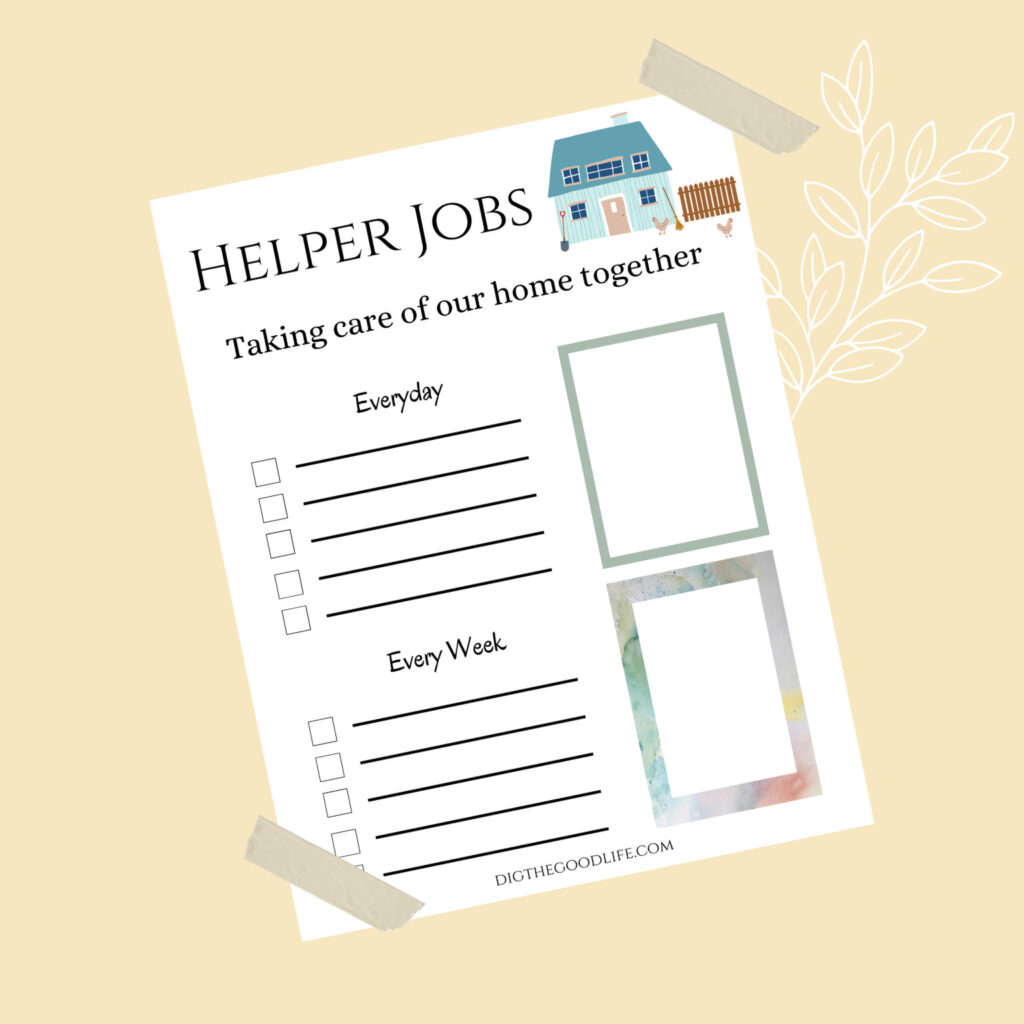A good routine and clear expectations go a long way to make your home and relationship with your kids run smoothly. I’ll explain why I see clear benefits and the need to understand why kids should do chores.
I have found that starting the day with a few responsibilities that help take care of our home is a great way to get off on the right foot.
I created a really cute free chore chart printable that you can grab at the end of this article!

Having a Healthy Perspective on Chores
{We are a participant in the Amazon Services LLC Associates Program, an affiliate advertising program designed to provide a means for us to earn fees by linking to Amazon.com and affiliated sites.}
You can call them responsibilities, life skills, or helper jobs, but I think most will agree that teaching our kids to take responsibility for their own space and contribute to the cleanliness of the family home is very important.
Check out this article I wrote all about why giving children natural responsibility and independence is SO important! Why Is It Important For A Child To Be Independent?
I strive to keep the mentality around chores in our home like this:
We all are a family, we share a home and we love each other. We love our home, and we all want it to be a comfortable and happy place to live together! You know how we make that happen?
We have to all participate, in some way together, in the care and keeping of our home, and we all need each other’s help in making our home this happy place.
Are Chores Bad for Kids?
We can’t talk about why kids should do chores, without mentioning the fact that some will say that chores are bad for children. That you shouldn’t expect them to do anything around the house. Is this true?
Whether you are parenting from a Christian perspective as I am or not, teaching your kids to pitch in around the house and be helpful is important… Not just so things get done, but most importantly for their own development and growth into mature and responsible people.
Charlotte Mason, renown British educator and author at the turn of the century, once said that “children are born persons”.
Mason is a figure that many homeschool parents turn to for her revolutionary, yet wholesome and classic advice on education and child rearing, insisted that children were majorly underestimated.
She helps us realize that just because one is young, that does not equate to being unworthy or incapable!
Pin For Later
(Hover over or tap red button in corner to save this to your Pinterest board.)

What Does the Bible Say About Child Training
First, the Bible is very clear about treating your children with kindness and love.
Fathers, do not provoke your children to anger, but bring them up in the discipline and instruction of the Lord. Ephesians 6:4
Fathers, do not provoke your children, lest they become discouraged. Colossians 3:21
Behold, children are a heritage from the Lord, the fruit of the womb a reward. Psalm 127:3
As a father shows compassion to his children, so the Lord shows compassion to those who fear him. Psalm 103:13
It is also very clear over and over that it is the parents job to train up a child in the way they should go.
Train up a child in the way he should go; even when he is old he will not depart from it. Proverbs 22:6 You shall teach them diligently to your children, and shall talk of them when you sit in your house, and when you walk by the way, and when you lie down, and when you rise. Deuteronomy 6:7 Children, obey your parents in everything, for this pleases the Lord. Colossians 3:20 Discipline your son, and he will give you rest; he will give delight to your heart. Proverbs 29:17
I believe this not only includes spiritual matters of faith and scripture, but moral training, training them to treat other people with decency and respect, training your children to take care of their own families one day, to have a good work ethic, I could go on.
If we don’t instill good routines and habits in our family life, this will only harm our children in the short and long term.
A nightmare for a loving parent would be to have regrets in hindsight that we didn’t do our job properly to ensure that our kids are equipped with the emotional, metal and technical skills to be independent, productive and able to live a live of purpose.
Chores and Rhythms Can Lay the Foundation of Lifelong Capability
Each time you help your child master a new skill, they are injected with a boost of confidence and purpose. All you have to do to know this, is to look in the face of a young child who has “done it themselves”. What an accomplishment!
Most of the time, it is easier to do tasks for your kids, than to let them struggle through it. It is challenging to maintain the patience required to slow your pace and allow them to practice these small skills themselves.
For example, if you think of it from a selfish perspective, you realize that if you put in the time up front, your child will be more independent and therefore lesson your tasks.
Of course, this is not our main motivating factor in teaching them, but it is a delightful outcome.
Examples of Appropriate Chores
I am not going to create a comprehensive list of appropriate tasks for different age children here, there are many great resources already available. But, I will speak to the overall approach I have found to make the most sense.
As I stated above, our general attitude towards responsibilities in our family is that we are all a family together and we all pitch in to take care of each other. Each person has different capabilities, and jobs suited best to them.
8/9 year old –
- Making own bed, cleaning up after herself in her room and bathroom
- emptying dishwasher
- Feeding and letting out chickens
- putting away clothes after I fold them
- taking care of own personal hygiene (clipping nails, bathing, shampooing hair and de-tangling, etc) with guidance and help
- helping clean bathroom when needed
4/5 year old –
- making bed (messy at first, but improved over time)
- picking up after oneself
- vacuuming bathroom floor
- wiping sink and counter
- putting away utensils from dishwasher
- giving pet fresh water
These are just examples of the things my kids are responsible for at these ages and maturity levels. Each kid has a different level of readiness for different tasks.
BUT, don’t make the mistake of thinking they are not capable of much, because they will probably surprise you when given the chance and training.
I LOVE this book aptly named Capable. It is a very comprehensive life skills checklist format, filled with things to teach your children about and how to do. The sections are sorted by age and subject.
**And this should go without saying but I will say it anyway… Regarding lists or the book: Parents should use their own discretion regarding when and what to teach their child depending on their abilities and maturity levels and the family’s best interest. Not all kids aged 10, for example, may be ready for everything in the aged 10 list.
Free Printable Chore Charts for Kids
Sign up for the newsletter below to get access to the Little Free Resource Library where the Chore Chart and all the printable live!
Capable – Book with age appropriate skills to teach your children
I hope you now have some ideas to move forward with awesome routines and responsibilities for your kiddos!
Always Dig the Good Life,






Leave a Reply